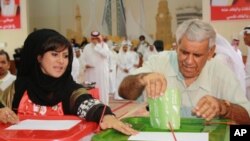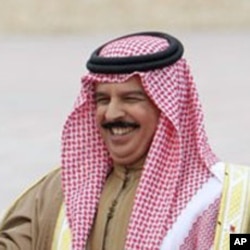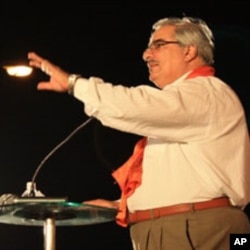Voting in Bahrain's parliamentary elections began on Saturday amid mounting tension between Sunni leaders and the country's Shi'ite majority. It is the Persian Gulf kingdom's third election since implementing a new constitution eight years ago, but a string of opposition arrests and a clampdown on the media have prompted fears that the monarchy is beginning to abandon its attempt at democracy and return to traditional authoritarianism.
Bahrain's Prime Minister Khalifa bin Salman al-Khalifa was one of the early voters on Saturday and after casting his ballot in front of a swarm of media, he reaffirmed his commitment to elected representation in the country.
Crackdown
His critics, however, say the Sunni Muslim-led government's recent crackdown on dissidents has undermined the entire process.
In August, 23 Shi'ite activists were arrested on charges of terrorism and planning to overthrow the government. Since then, over 200 opposition supporters have been detained, some claim they were abused or even tortured while in custody.
According to the president of the Bahrain Center for Human Rights, Nabeel Rajab, the real motive behind the arrests was to prevent Shi'ites from gaining a majority in parliament. He says the action has made many Bahrainis loose faith in the election.
"For sure the impact of the crackdown and the arrests is going to have an influence on the whole situation and I think the turnout for the election is going to be much less than what was expected," said Nabeel Rajab.
Voters participation
Professor of international relations and Middle East politics at the University of Exeter, Gerd Nonneman, says it is hard to predict what the overall voter numbers will be, but he says a low Shi'ite turnout could actually be harmful for the government.
"If there is a lack of participation in the elections then all the old tensions will re-emerge for which the liberalization program has been started in the first place. Plus, where as in the past the opposition was not really sectarian, it's becoming increasingly so, partly because of government policy," said Nonneman.
'Model for emerging democracies'
For the past decade, the West has viewed Bahrain as a model for emerging democracies in the Arab world.
King Hamad bin Isa al-Khalifa brought sweeping political reforms to the nation when he came into power in 1999. In addition to creating a new parliament, which is still more or less controlled by the king, he released all political prisoners and gave women the right to vote. The parliament only has limited policy-making powers because all bills need to be passed by the upper house whose members are appointed by the king.
Amnesty International said Bahrain's reforms represented a "historical period of human rights". The country's Shi'ite community, however, continued to claim that they were being treated as second-class citizens.
Today, Shi'ites represent over 70 percent of Bahrain's population. They say they are not given equal housing, health, or education benefits. They also say most government institutions refuse to employ them.
What's more, Shi'ite representatives accuse Sunni leaders of issuing Bahraini passports to foreign Sunnis who do not meet naturalization requirements in order to weaken the Shi'ite majority. The government has denied this.
Internal issues
Outside powers continue to keep a close eye on Bahrain's internal problems. One major concern is that Iran, which is predominantly Shi'ite, may try to exploit the situation in order to gain a foothold in the Arab peninsula.
Nonneman says Bahrain's parliamentary elections and the resulting political climate could be a determinant of this.
"The problem is that if the political system looses legitimacy, then you may well get sections of the Shi'ite less privileged population turning to supports wherever they can get it," he said. "Some have been looking towards Iran for a while and Iran's actually always been rather standoffish. Ultimately, the one thing that may draw Iran in more closely is the kind of policy that the [Bahraini] government now seems to be pursuing.
U.S. interest
Experts say the United States has a vested interest in Bahrain as the U.S. Navy's 5th Fleet is based there.
However, American authorities have been reluctant to comment on the nation's recent wave of unrest.
Spokesperson for London-based Bahrain Freedom Movement, Saeed Shehabi, says it is time the United States became more involved.
"The United States has a duty," said Shehabi. "If it wants [to promote] its interests and a safer world, Washington must not continue supporting these absolutist rules. These are antiquated, outdated systems of government that have no place in modern times."
The Bahraini government insists its recent crackdown on "terrorists", who they say were planning a coup, was not linked to the parliamentary elections.
The Minister of Justice and Islamic Affairs Shaikh Khalid bin Ali al-Khalifa also says that in the wake of demonstrations, small fires and even an explosion in the streets, the government had to act the way it did to protect the public.
"Many people suffered from this. Civilian population was targeted," he said. "Some civilians were really subjected to fear and the main issue is that we will not allow any party or power or group of people to use force to further any kind of agenda."
Al-Khalifa also went on to dismiss suggestions that the parliamentary elections will have a low turnout. "I don't ever believe that. I think the process is going on. Maybe some people disseminate a kind of disillusion just to attract some votes. At the end of the day, everyone is participating. All the political parties are hoping for their candidates to take a seat on the parliament," he said.
One of the candidates vying for a parliamentary seat is the leader of the National Democratic Action Society, Ibrahim Sharif Al Syed. Speaking at his last political rally before the elections, he urged his supporters to vote.
He later admitted that Bahrain's parliament does not have much power compared to some foreign legislatures, but he says Bahrainis should take advantage of what they have and that both government and opposition supporters should use the parliament to let their voices be heard.
"Let's just say this in not a legislative parliament, it's a parliament where we can expose things as real and basically educate people," said Syed.
Bahrain has about 318,000 registered voters out of a population of around 1.3 million.







